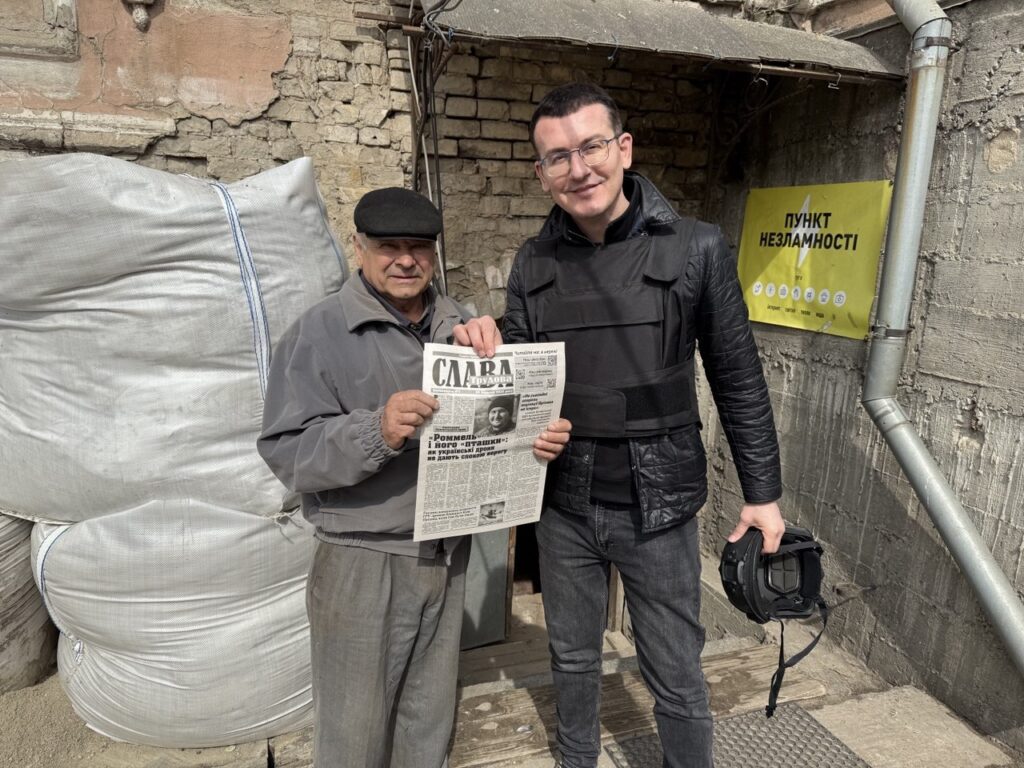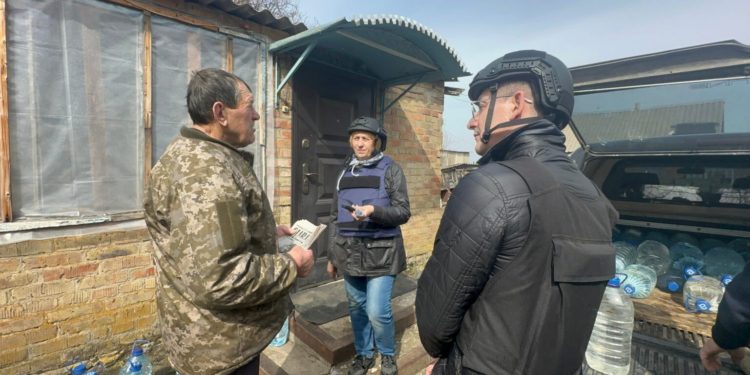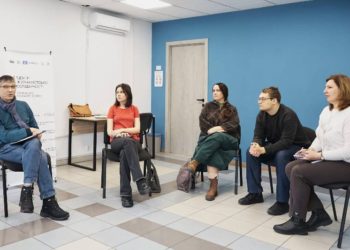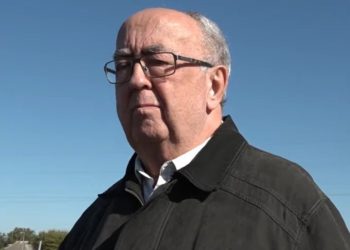“The first sip of water after thirst” – this is what one of the readers called the “rare” Orikhiv-based newspaper Trudova Slava… Orikhiv and the villages of the Orikhiv Community of the Zaporizhzhia Region are a real front-line zone. 85% of the city has no electricity. Every day, the russians shell Orikhiv and the surrounding villages. But almost a thousand local residents refuse to leave their homes and continue to live and survive…
At the end of March, the President of the National Union of Journalists of Ukraine (NUJU), Sergiy Tomilenko, together with the editor-in-chief of the Trudova Slava newspaper, Svitlana Karpenko, drove along the so-called “bread” route with Zaporizhzhia rescuers – they delivered 720 loaves of bread to residents of several villages and Orikhiv. We visited the villages of the Preobrazhenka Community – Vasynivka, Omelnyk, Chervona Krynytsia, in the Orikhiv Community – directly in the city of Orikhiv and also met with the press officers of the 65th separate mechanized brigade Velykyi Luh. It is symbolic that the local residents were brought a fresh issue of the newspaper along with bread.
“Due to the high risk of shelling by russian drones, our car was equipped with a helmet. Driving through several villages on the border to the front – only four kilometers away – at the insistence of rescuers, we were wearing helmets even in the car. But RW is not saving us at the moment. The russians are increasingly launching drones flying on fiber optics – that is, on the “thread” that transmits the Internet, so RW cannot silence such drones and stop their deadly shelling,” says Sergiy Tomilenko.
For local residents, access to information is extremely limited. But it is also extremely important.
“When I started handing out the newspaper, people immediately reacted: “This is our dear Trudova Slava! Such warm words are today the highest award for the work of journalists of our local publication,” notes Svitlana Karpenko.
Vasyl, one of the few residents of the village of Chervona Krynytsia who remain in their homes, complained during a meeting with journalists that he has been living without electricity for a year and eight months.
“He learns the news very rarely. Only when rescuers come to the village. Or when he occasionally goes out to get medicine. There is no Internet, radio, or television either. His newspaper is of great value; thanks to it, Vasyl is convinced that “we are in Ukraine, we are on our native land,” notes the President of the NUJU.
He draws attention to the fact that even in front-line conditions, people strive to live according to the rules and habits of a peaceful life – they take care of their gardens and look after their livestock. In the village of Omelnyk near Orikhiv – just five kilometers from the front – the participants of the trip saw a man and a woman carefully cultivating a flowerbed in the center of the village.
“Despite the difficult situation, farmers continue to work,” shares impressions from the trip Svitlana Karpenko. “They try to grow crops, as in peacetime. I remembered the words of the head of the Novoselivske District, Oleksandr Shevchenko: “Farmers, in principle, almost all work. They take risks, but the land still bears fruit. Everyone is preparing for a sowing campaign.” And although some of them lost up to 50% of last year’s harvest due to lack of hands, they still continue to work.”
People are used to difficult conditions, but the most important thing for them remains peace. “What do we need? Peace. Peace, and that’s all,” said Pavlo, a resident of the village of Vasynivka, in a conversation with journalists.
In Orikhiv, the main center of invincibility and the place of receiving humanitarian aid and government services is the city hall. More precisely, the basement of the city council building because the second floor of the building is completely destroyed, the first floor is partially destroyed, and there is not a single intact window. In the renovated basement, rooms have been equipped for a doctor – a paramedic station, a room for Ukrposhta employees, rooms for employees of the city military administration, who provide social services, accept applications from local residents for building materials in order to initially close the buildings that have suffered from new shelling by the occupiers.
“We shook hands with the head of the Orikhiv City Military Administration, Mykola Vinichenko, a courageous front-line mayor,” says Sergiy Tomilenko. “But what impressed us the most was another point of invincibility, also in Orikhiv: local residents – all elderly, 11 families – have equipped themselves with shelter in the basement of an apartment building. And a kind of commune was formed – with its own rules of coexistence, use of the “kitchen” – a basement space where each family has its own mini-gas stove for cooking; a “men’s room” – where men play dominoes or chess. This basement has lighting, which is often turned off due to russian shelling of the power grid. There is a backup generator. But the locals, ordinary elderly women, are convinced that their presence is saving Orikhiv. “Without us, everything would have been looted here. So, we save the apartments for ourselves and our neighbors.” During the day, when there is constant “banging” – loud explosions can be heard – the locals feel safer and disperse to their apartments. And in the evening, everyone goes to spend the night in “their native basement.”
According to Mykola Vinichenko, the situation has worsened significantly recently.
“The shelling does not stop. Volunteer cars with a humanitarian worker are being attacked by drones. People live in constant fear,” he says. “Now, a total of 787 people remain in the city of Orikhiv, in total – 1,132 people in the community. Since the beginning of the war, there have been no children in the territory; they have all been evacuated. But many people do not leave; they are waiting for the end of the war, for our victory….”
It was especially difficult for Svitlana Karpenko to see the ruins of her native newspaper premises, where she had gone to work for years.
“Two years ago, when I first came to the front-line Orikhiv – in March 2023, most of the windows in the building were still intact,” says Sergiy Tomilenko. “The sign reading Editorial Office of the Trudova Slava Newspaper was still there. Now, there’s not a single surviving window; all the rooms are destroyed, the ceiling is falling, fragments of the sign were blown away after the shelling… But Svitlana does not accept bitter thoughts about the future. She sometimes complains about not having registered the premises as a historical monument in the past and sometimes worries about whether she will receive support for the reconstruction. But she believes that the time will come, when she returns from the relatively safer Zaporizhzhia, where she currently lives, to her native Orikhiv and rebuild the editorial premises. And she will continue her noble cause – to unite her fellow countrymen, informing about important news of the city and community.”
During this trip, Svitlana Karpenko was the first of her colleagues to receive the NUJU Special Award for the revival of the front-line press.
“Because journalists are important. Especially where their word is like a sip of water after thirst,” concludes the head of the NUJU.

NUJU Information Service
Photo by Sergiy Tomilenko, Anna Lohvynenko, Yevhen Cherevko

 THE NATIONAL UNION OF
JOURNALISTS OF UKRAINE
THE NATIONAL UNION OF
JOURNALISTS OF UKRAINE
















Discussion about this post